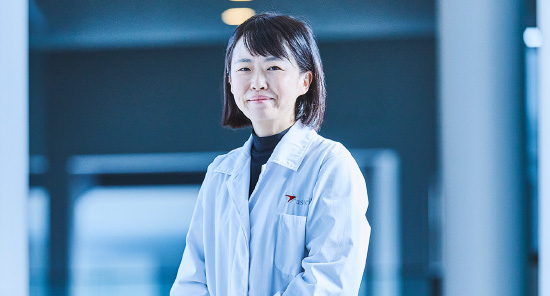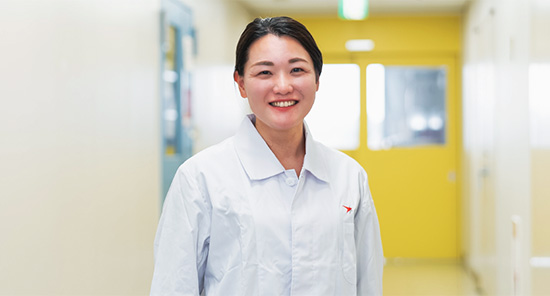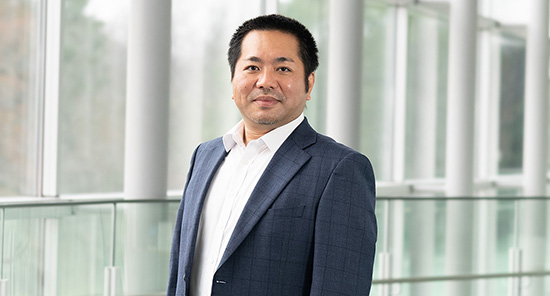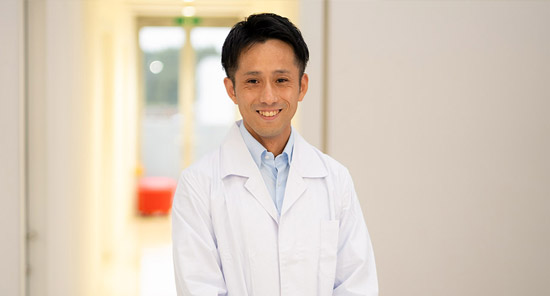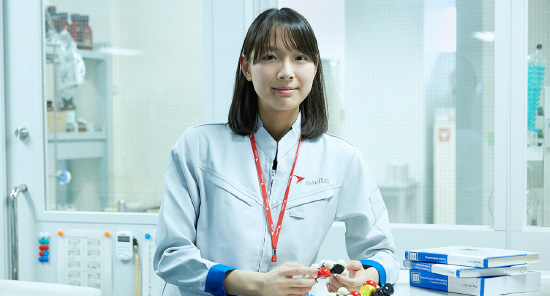Interview

 Discover new treatments
Discover new treatments
based on data
*The present:Digital X Ayumu Asai
Astellas’ proactive research approach struck a chord with me and led to my decision to join the company
When I started university, I studied pharmacy as a whole with the goal of becoming a pharmacist, but after I was assigned to a laboratory, I became fascinated with research and began pharmaceutical research. After finishing graduate school, I became a postdoc and turned away from pharmaceutical research, endeavoring to focus on cancer research instead. My research was mainly fundamental research to find out more about the characteristics of cancer and development research on cancer diagnosis and treatment. Later, during the process of becoming an assistant professor, I acquired data analysis skills through self-study.
I wanted to apply the experiences and skills I had gained to disease treatment and drug discovery as the axis of my career path as a researcher. I considered numerous pharmaceutical companies, but Astellas attracted me not only with its strength in drug development and sales but also its emphasis on data-driven drug discovery. Also, at the academic meetings I participated in as a student, Astellas was very proactive in presenting its research results and actively participated in discussions with external parties, giving me the impression that Astellas is an open-minded company. Another point I found attractive was that Astellas had a strong presence in the field of pharmaceutical research, where I had been doing research for a long time.


Repetition of experiments and verifications paves the way for the future
Currently, I am responsible for bioinformatics analysis as a member of Advanced Informatics & Analytics, which analyzes various data collected internally as well as outside of the company and utilizes it to promote drug discovery for the creation of new treatments. My main tasks are to analyze data taken from public databases and internal experiments, then, make proposals such as for drug discovery targets and biomarkers for predicting drug efficacy. I tend to be mostly responsible for the cancer and autoimmune disease areas. Both areas are similar in how the site of onset and pathology widely vary even for diseases with the same name. I analyze the differences between each patient from the perspective of personalized medicine, or the similarities between the patients so that we can target the common points for the disease.


Projects are set up for each disease or drug, and I am involved as a member of such projects. Because the demands, as well as the knowledge and skills required, are different for each project, when I make any proposals, I need to consider the standpoints and concepts of each project and find a better solution. What I find the most difficult is the interpretation of causality. In bioinformatics analysis, we need to identify the gene that triggers the disease onset among tens of thousands of genes. It would be ideal if we could compare the genetic data of the same patient before and after disease onset, but that is not realistic, so we compare the genetic data of the patient to that of a person without the disease. However, each dataset would include individual-specific genetic data or changes in genetic data due to disease onset. Even so, we can narrow them down to several candidate genes that are related to the cause, but it is extremely difficult to identify the exact gene causing the disease. Currently, all we can do is use that analysis to conjecture a theory from a biological perspective and repeat experiments and verifications. I wish to increase the accuracy of analysis by making better use of data.
Data analysis only increases the chance of success, and it does not work 100% of the time. I find it very rewarding when my analysis leads to success; I feel a sense of accomplishment that my analysis results were correct and joy that I was able to help other people.


Collaborate with various fields and take on the challenge of creating innovation
I think my potential increased by making use of Astellas’ “diversity”. I researched pharmaceutical science, medicine, and informatics at university so that I could become a researcher who can solve various issues. However, I was only doing one-off data analysis to solve the questions and issues at hand, and felt the limits in what a small group can do. At Astellas, there are employees with diverse expertise working on various projects. Numerous discussions with them led me to a new world I could not envision before. Thanks to them, I could succeed in tasks I had never experienced before, such as the development of an original analytical platform used by a large number of people.
I am now hoping to take up the challenge of understanding disease from the molecular level. Current disease categories are based on “what kind of symptoms are present at each site”, but scientific development has suggested that a different mechanism (actions at the molecular level) can cause the same disease, or the same mechanism can cause different diseases. My ambition is to have a better understanding of each disease by focusing on such actions at the molecular level and to propose new treatment strategies.
The working environment at Astellas is attractive: it is accepting of new challenges and the employees are rich in diversity. Exposure to diverse opinions and experiences leads to new ideas and collaborations. It is not unusual to see information sharing within a division develop into conversations such as “I didn’t know that was possible. Let’s research this together.” I hope to continue working with my team members so that we can innovate and deliver better solutions to our patients.

